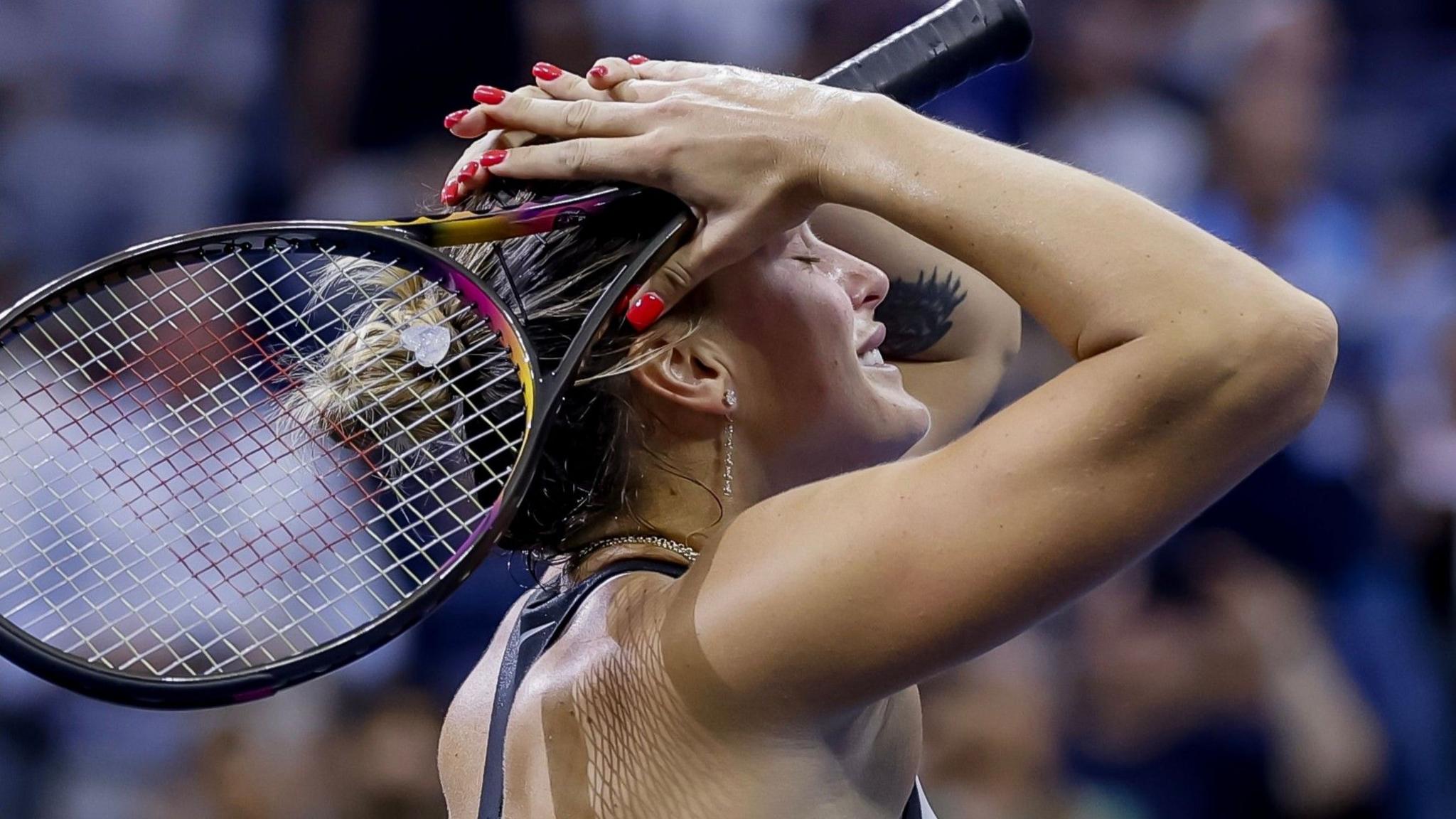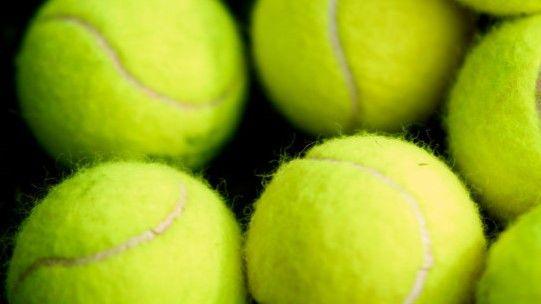Why winning US Open means more to Sabalenka
Sabalenka retains US Open to win first grand slam of 2025
- Published
US Open 2025
Venue: Flushing Meadows, New York Dates: 24 August-7 September
Coverage: Live radio commentaries across 5 Live Sport and BBC Sounds, plus live text commentaries on the BBC Sport website & app
If a picture paints a 1,000 words, then the image of Aryna Sabalenka celebrating her latest US Open title provides a vivid description of what victory means.
Falling to her knees on the court, covering her face and shaking with adrenaline summed up the stress the world number one had been feeling.
Sabalenka, 27, has been the WTA Tour's most dominant player again this season - winning more titles, more matches and more points than anyone else.
But she still had not lifted a Grand Slam trophy in 2025 until beating Amanda Anisimova 6-3 7-6 (7-3) in Saturday's final in New York.
"This one felt different. It felt like I had to overcome a lot of things to get it," said Sabalenka, moments after striding into her victory news conference clutching a champagne bottle.
"I knew that [because of] the hard work we put in, I deserved to have a Grand Slam title this season."
Questions have been raised about Sabalenka's emotional strength in the final stages of the Grand Slams.
She answered them with a mature and largely-disciplined performance against Anisimova.
It was a stark contrast to the way she lost the Australian Open and French Open finals to Madison Keys and Coco Gauff respectively.
She also learnt from her mistakes in the Wimbledon semi-finals, where she lost to Anisimova.
"When I fell [to the court], it was because it means a lot to defend this title and to bring such great tennis," said Sabalenka.
"To bring the fight and be able to handle my emotions the way I did in this final, it means a lot.
"I'm super proud right now of myself."
Sabalenka keeps cool to retain US Open title
- Published7 September
New coach & holiday book provide perspective
Wearing her heart on her sleeve is one of the things that endears Sabalenka to her fans.
Frowning brows, narrowing eyes and pursed lips often follow missed shots. Relieved roars greet winners at crucial junctures.
Sabalenka's team - led by long-time coach Anton Dubrov, hitting partner Andrei Vasilevski and fitness coach Jason Stacy - feel the force of her sharp stares and annoyed outbursts.
As she clutched the US Open trophy once again, she apologised for being "terrible to them" after her Melbourne and Paris losses, then reiterated her love for a unit she considers "family".
The long-time allies were stood alongside 10-time Grand Slam doubles champion Max Mirnyi, who Sabalenka brought in as a second coach going into the final major of the season.
Mirnyi says the team operated by a simple principle as they aimed to guide her to another New York title - that her game was not broken so it did not need fixing.
"She's definitely wasn't broken by any means - she is the top player in the world, won the best tournaments and beaten the best players time and time again," he told BBC Sport.
"It's just been a matter of evolving and improving her game and trying to add different facets to it.
"Maybe being a bit more versatile on serve and being more dominant, trying to enhance her powerful groundstrokes by finishing some balls at the net.
"She's very quick on catching onto things I have mentioned and we have been working on."
It was down to Sabalenka to find inner peace in order to execute her technical skills and tactical plan in the high-pressure moments.

Aryna Sabalenka is the first woman to defend the US Open singles title since Serena Williams in 2014
Working with a psychologist for several years helped her become a Grand Slam champion, but realised recently she was "relying too much" on the expert and wanted to "figure things out more" herself.
A post-Wimbledon trip to the Greek island of Mykonos provided an opportunity for further self-analysis.
Reading a book recommended by friends - about harnessing the power between the mind and the heart - has also been instrumental.
"Reading that book I realised a lot of things," she added.
"It really helped me to stay focused and to focus on the right things on important points."
Calmer Sabalenka reaps rewards
Sabalenka had already won three major singles titles but still felt she had something to prove at Flushing Meadows.
A machine-like consistency at the Grand Slams - unrivalled in the women's game - has led to 12 semi-finals in her past 13 major appearances.
But a return of three trophies from that run felt below par.
"Everything fluctuates in life," Mirnyi added.
"We're not machines, we're not robots, right? As good as some of the professionals are in their fields, they're still human.
"It comes down to being good, but not always perfect. A tennis match is very tough to make perfect."
Controlling Saturday's final was down to Sabalenka keeping calm on court - and resisting the temptation to lose her temper when things were not going her way.
A telling moment came when she dumped an overhead smash into the net as she tried to serve out victory at 5-4 30-30.
Usually there would have been an angry outburst or a slamming of a racquet.
Instead she forced a stifled smile as she turned towards her team, before walking back to the baseline for the next point.
"In the first set when she broke me back, and at the end of the second set when she broke me back, there were moments where I was really close to losing control," Sabalenka said.
"At that moment I told myself: No, it's not going to happen. It's OK."
Related topics
- Published16 August

